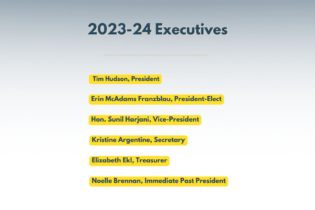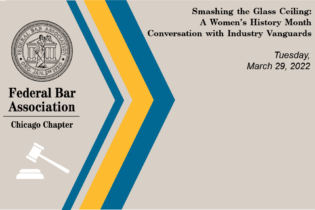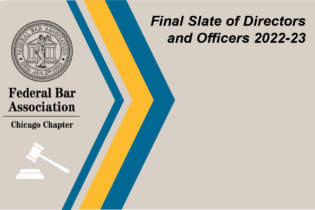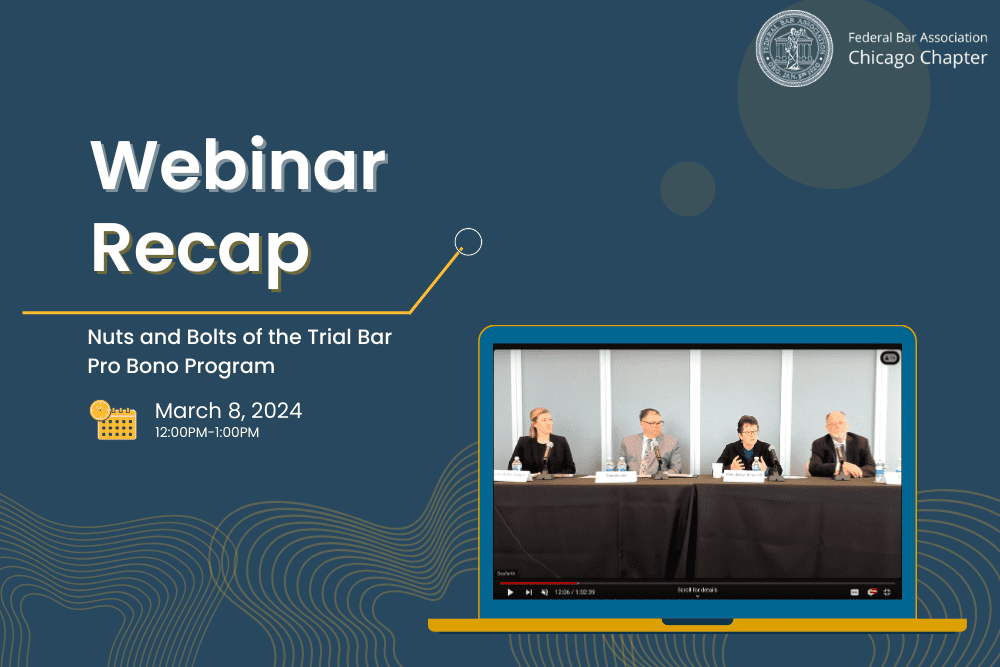
Trial Bar Pro Bono Program: Exploring the Nuts and Bolts
The Federal Bar Association’s Chicago Chapter recently organized a webinar on March 8, 2024, titled “The Nuts and Bolts of The Trial Bar Pro Bono Program”. This webinar provided an in-depth analysis of the pro bono efforts within the federal bar as it relates to assigned cases.
The session was inaugurated by Kristine Argentine, a partner at Seyfarth Shaw LLP and a member of the Federal Bar Association’s Chicago Chapter Board. Argentine emphasized the crucial role that federal judges play and highlighted how the Federal Bar Association facilitates the development of professional connections and growth within the legal community.
Enhancing Pro Bono Legal Advocacy Through the Trial Bar Pro Bono Program
The webinar aimed to enhance the understanding of pro bono work within the federal legal framework, with Argentine spotlighting the program’s dedication to assisting individuals who are unable to afford legal representation, particularly focusing on prisoners and employment cases. This initiative demonstrates the legal community’s commitment to narrowing the justice gap.
A panel of experts, including Alan Mills of Uptown People’s Law Center, the Honorable Mary Rowland from the Northern District of Illinois, Court Clerk Tom Bruton, and Leslie Kuhn-Thayer, Pro Bono Counsel at Sidley Austin LLP, provided insights into the program and litigation of these types of cases. Their experiences highlighted the various challenges and complexities associated with these types of cases and the sense of fulfillment that comes from contributing to such efforts. The discussion emphasized the crucial role of the pro bono program in guaranteeing equitable access to justice, especially for marginalized groups and individuals facing legal challenges without the means for representation.
By focusing on the needs for legal support in prisoner and employment cases, the webinar shed light on the critical impact of pro bono work on the lives of affected individuals. The panelists’ insights served not only as an educational resource but also as motivation for legal professionals to apply their expertise for the benefit of society.
Overall, the webinar reinforced the importance of pro bono work in the legal profession, highlighting it as an essential pathway for professional development and societal impact. It reiterated that the Northern District of Illinois, the Federal Bar Association and groups like the Uptown Peoples Law Center are committed to creating a community where access to justice is universally available.
Foundations and Impact of the Trial Bar Pro Bono Program
During the “Nuts and Bolts of The Trial Bar Pro Bono Program” webinar, Tom Bruton provided a historical overview that traced the program back to its inception in 1983 by the Honorable Marvin Aspen. Aspen’s vision was to elevate the level of professionalism in the legal field while offering attorneys precious courtroom experience. Bruton discussed the rigorous membership criteria for the Trial Bar, underscoring the program’s commitment to excellence and the professional development of its members. This review of the program’s history highlighted its dedication to superior legal representation and the growth of its participating attorneys.
Leslie Kuhn-Thayer discussed the dual benefits of engaging in pro bono work, noting its profound impact on both clients and attorneys. For clients, particularly those who are incarcerated, access to adept legal representation can significantly change their life trajectories, providing hope in adverse situations. For attorneys, Kuhn-Thayer explained, pro bono cases offer lawyers opportunities to refine litigation skills, participate in meaningful legal activities, and contribute positively to societal well-being. This insight into pro bono work’s value demonstrated the mutually beneficial relationship between community service and professional enhancement.
The contributions from Bruton and Kuhn-Thayer together outlined the core of the Trial Bar Pro Bono Program, rooted in a commitment to excellence and its enduring legacy of benefiting the lives it touches and the careers of those who participate. This comprehensive view not only celebrated the program’s successes but also underscored its crucial role in the broader legal framework, closing justice gaps case by case.
Practical Guidance and Judicial Insights for Pro Bono Representation
In further discussions, Alan Mills provided crucial advice for lawyers new to representing prisoners pro bono, stressing the importance of prompt, effective communication and highlighting resources available to navigate the unique challenges of such cases. Judge Rowland complemented this with a judicial perspective on assigning attorneys to cases, illuminating the complexities faced by prisoners representing themselves and the critical need for competent legal representation.
Mills’ practical advice and Judge Rowland’s judicial insights offered a complete picture of the pro bono program’s expectations and challenges. Their combined wisdom emphasized the necessity of readiness, efficient communication, and the significant role attorneys play in providing access to justice for those unable to confront the legal system alone. This discourse did not just inform but also motivated legal professionals to lend their skills to those in dire need, reinforcing the fundamental values of fairness and justice within the legal community.
Navigating Settlements and Ethical Considerations in Pro Bono Cases
The “Nuts and Bolts of The Trial Bar Pro Bono Program” webinar extensively covered the intricate process of negotiating settlements, with a particular focus on cases involving prisoners. The panelists provided insight into the complexities of such negotiations, emphasizing the importance of fully understanding the client’s situation and how the terms of a settlement could affect their future. This portion of the discussion brought to light the unique challenges inherent in prisoner cases, where reaching equitable settlements necessitates a well-considered balance between legal tactics and the client’s welfare.
Moreover, the webinar delved into the ethical aspects of fee arrangements in pro bono work. The discussion pointed out specific legal frameworks that allow for the recovery of attorneys’ fees following a successful case resolution. This aspect serves as a bridge, connecting the altruistic nature of pro bono services with the practical financial realities of legal practice. By exploring this topic, the panelists illuminated the ethical duties legal professionals bear, not just in championing their clients’ causes but also in responsibly managing the financial dimensions of legal representation.
The synthesis of viewpoints on case settlements and the management of attorneys’ fees provided a holistic understanding of the nuanced balance that pro bono legal work demands. It highlighted the dual objectives that pro bono attorneys must pursue: ensuring justice for underserved clients while upholding the ethical standards of the legal profession. The insights shared during the webinar offered valuable guidance for legal practitioners, advocating for a thoughtful approach to pro bono engagements that honor both the foundational principles of justice and the ethical obligations of the legal field.
Future Direction for Legal Advocacy and the Trial Bar Pro Bono Program
The webinar concluded by spotlighting forthcoming seminars tailored to the representation of prisoners in civil rights matters. Aimed at furnishing attorneys with both the theoretical knowledge and practical expertise required to successfully represent their clients, these seminars underscore the program’s dedication to the ongoing professional growth of legal practitioners and the broader goal of ensuring equitable access to justice.
“The Nuts and Bolts of The Trial Bar Pro Bono Program” webinar effectively underscored the legal profession’s inherent duty to contribute to the community and guarantee that justice is accessible to everyone, regardless of their financial standing. The session, enriched with historical context, pragmatic guidance, and engaging discussions, motivated attorneys to pursue pro bono initiatives, thereby facilitating significant professional and societal advancement.
As the legal sector advances through the evolving landscape of pro bono legal services, such educational events are instrumental in nurturing a culture committed to high standards of service and professional excellence. The Federal Bar Association’s Chicago chapter, through initiatives like this webinar, plays a pivotal role in not merely instructing legal professionals but in shaping them into formidable advocates for justice, ready to address and surmount the challenges of pro bono representation.
For further insights, please watch the full webinar on YouTube. To continue the conversation, feel free to connect with Kristine Argentine, Alan Mills, and Leslie Kuhn-Thayer on LinkedIn.
Do you want to stay involved with the Federal Bar Association Chicago Chapter? Explore our upcoming events and educational opportunities for attorneys!

